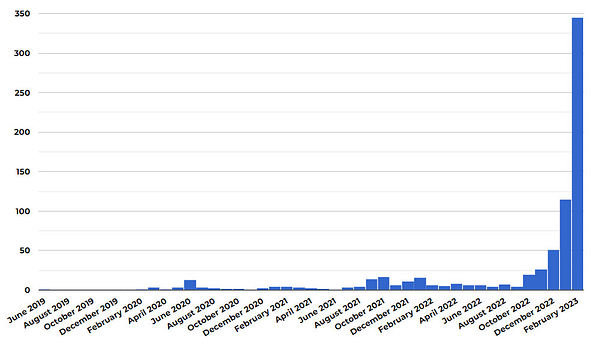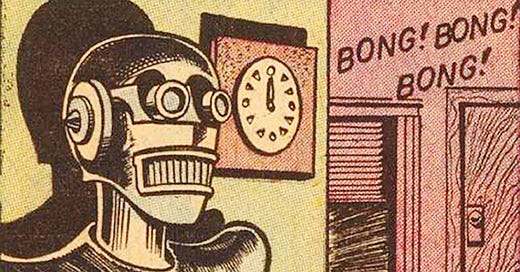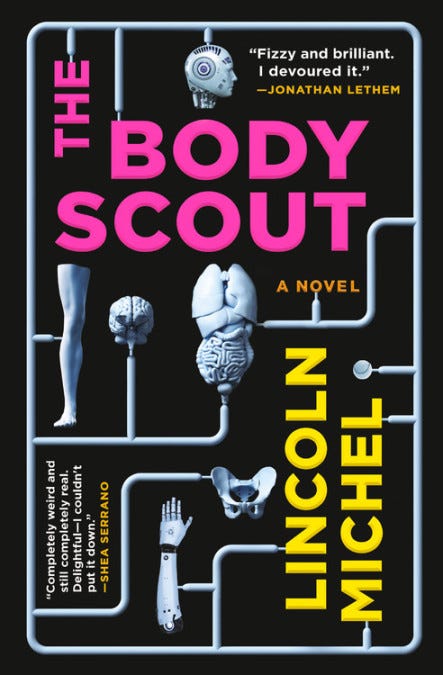The Flood of ChatGPT Crap About to Clog Up Publishing
A lit mag closed submissions after being overwhelmed with "A.I."-written stories. They're probably just the first.
Will “A.I.” programs soon pen our symphonies? Is every profession doomed to be replaced with machines? Are we nearing an A.I.-assisted utopia or a robot-run hellscape? Who knows. I’m on the record as a “A.I.” skeptic—I can’t help but notice the A.I. hype cycle has replaced last year’s “Web 3” hype cycle that went bust—but instead of imagining future utopian or dystopian scenarios, let’s talk about the present. Right now, programs like ChatGPT are mildly amusing gimmicks. They produce generic, error-filled writing closer to cheap plagiarism than any kind of intelligence. They’re nowhere close to replacing our great novelists. Or even the okay ones. But this week we’ve seen evidence that ChatGPT doesn’t actually have to get good to be bad news for writers.
A few days ago, the great science fiction magazine Clarkesworld revealed their submission queue has been overwhelmed with A.I.-written story submissions:


Yesterday, they shut down submissions. Now, Clarkesworld isn’t folding and they say they’ll open submissions again. But it’s hard not to imagine the SFF magazine world is just the first place to experience the coming torrent of “A.I.” crap from writers who don’t actually want to write. (I’m not litigating what uses of writing are valuable or not. There are ways to use these programs and maintains artistic integrity. I’m talking about people who want to pump out stories without putting in the work.) Even if ChatGPT and its sequels don’t improve much—even if they never produce anything worth publishing at all—they could easily clog up every slush pile, agent inbox, and editor submission queue.


One thing people outside publishing—and I include writers who haven’t worked on the publishing side—often don’t realize is the numbers. The numbers are overwhelming. The number of submissions to magazines, queries to agents, or manuscripts sent to editors. When I co-ran a small literary magazine with minimal circulation and no money, we’d get 1,000 submissions for each issue. More popular magazines get many times that. Clarkesworld says they get over 12,000 a year. They only publish a few dozen. Editors have to wade through hundreds of submissions for every one they accept.
Even the number of books published each year—themselves the lucky few who make it through the gauntlet of agents and editors and sales departments—far exceeds the number of books people want to read. Publishing is filled with flops and failures and few writers can survive on book sales alone. And that’s not even taking into account the world of self-publishing, which has its merits yet is already filled with an ocean of crappy work, scams, and plagiarism.
The world doesn’t need more generic writing. We already have more writing—including ore good writing—than we can handle.
As much as people love to rail against “gatekeepers,” something has to pare down the oceans of work out there. Right now, there are a series of bottlenecks that winnow work until it gets into the hands of readers. And almost all of those gates are kept by people who are already overworked and underpaid. What happens when these numbers grow exponentially? What happens when the already unmanageable river becomes a torrent?
Keep in mind it won’t take an exponential number of wannabe writers to clog everything up. It will only take a small number of people using ChatGPT or similar programs to produce a massive amount of AI writing. That’s the only advantage of ChatGPT: it produces crappy work, yes, but at a rapid pace. The type of writer who won’t even write their own work is unlikely to honor, say, the submission guidelines of magazines or the rules of agent querying. They’re going to clog everything up.
Who are the type of people who want to publish without putting in the work? I can imagine plenty of types. The frustrated writer who decides to brute force their way into a publication history. The type of person who thinks art is about “ideas” not execution. The person who fancies themselves an artist yet “hasn’t had the time” to write the genius work in their head. Tech world trolls. And perhaps people who think publishing could be an easy buck (Neil Clarke at Clarkesworld said some of the banned submitters claimed responded “But I really need the money”).
So what will magazines, agents, editors, etc. do to deal with this torrent? Well, we might look at how they’ve handled the dramatic increase of submissions that came with online submissions. Some magazines charge fees, others have blink-and-you-miss submission windows, others focus on solicitations. Some just never respond to the slush at all. These solutions work for the magazine, but are not particularly friendly or fair to writers.
This seems like the most obvious way to handle the flood of AI crap. To limit or shut down the slush piles. To focus on soliciting established authors or getting recommendations from trusted networks like MFA programs or Clarion grads. But all of this will serve to only make art more elitist and harder to access for people without the privilege or connections. It’s all bad news.
And I think it could get even worse than that. Another recent lit world news story I’ve been thinking about is Becky Tuch’s post on a bunch of lit mag and small press scams. There might not be a lot of money in being a writer, but there is a lot of money in preying on the dreams of aspiring writers. Magazines and presses that charge fees without publishing the work. Editing services that steal money from writers without helping them. If publishing is clogged with with AI crap, aspiring writers without connections might turn even more to these longshots and scams. And, sadly, those grift themselves could grow more lucrative with AI. If you’re running a scam press, why not get ChatGPT to read and reject manuscripts after collecting fees? If you’re running a crappy editorial service, why not just let ChatGPT write your editorial notes?
These “A.I.” art and writing programs are being pitched as egalitarian and democratic. A way for every person to be an artist or writer. The results are likely to be the opposite. The rich tech elite getting richer and the gates getting higher while everything gets harder for everyone else.
If you like this newsletter, consider subscribing or checking out my recent science fiction novel The Body Scout that The New York Times called “Timeless and original…a wild ride, sad and funny, surreal and intelligent.”
Other works I’ve written or co-edited include Upright Beasts (my story collection), Tiny Nightmares (an anthology of horror fiction), and Tiny Crimes (an anthology of crime fiction).







I think my vision of a good journal is a very close relationship between readers and writers -- readers becoming writers, writers staying on as readers even as they stop publishing. I think the landscape now is a huge variety of mostly interchangeable journals that writers are mass submitting to. "Read the journals to see if your work is a good fit," sure, but the distinctions are not always easy to describe or see.
Which is to say, if new tech is causing trouble it's because our monocultural world was already headed in this direction. My hope would be that journals can continue to thrive by more clearly defining themselves and thereby cultivating a closer relationship between readers and writers, drawing writers from an enthusiastic readership.
I hadn't even thought of the onslaught of AI submissions to Lit. Mags. I know Upwork is already swarming with lazy people trying to get writers to revise ChatGPT stories and romance novels, people offering thirty dollars for developmental editing of 30,000 words. It’s ridiculous. Becky Tuch’s recent essay, which you mentioned, was another eye-opener for me.
It will only get worse from here.